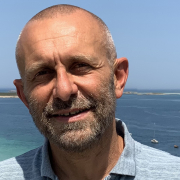
Copyright : Laboratoire LEMAR- 2018
Stéphane POUVREAU
Agence de l’Eau Loire Bretagne
Start Date
02/04/2025
End Date
02/04/2025
The call for initiatives for Marine Biodiversity, launched by the Agence de l’Eau Loire Bretagne (AELB) in November 2022, aimed to bring to light concrete actions to preserve or restore biodiversity by restoring the natural functionalities of coastal ecosystems, while promoting the emergence of resilient coastal developments, of the nature-based solutions type. The REHPAR project (REstauration de l’Huître PlAte en Rade de brest) is one of the 26 winning initiatives in this call for projects.
This project, led by the Comité Régional de la Conchyliculture Bretagne Nord (CRCBN) and with Ifremer (Laboratoire LEMAR) as scientific partner, concerns the ecological restoration of a flat oyster bed in the heart of a former oyster farm in the bay of Brest. This project is also being carried out in collaboration with the Parc Naturel Régional d’Armorique (PNRA), which is responsible for the Natura 2000 zone in the area. This triple partnership around the ecological restoration of a species and its habitat makes this project a first in terms of support and is fully in line with the territorial dynamics supported by the TERRA-RADE bay contract.
From a technical point of view, this is a true ecological engineering project using attractive biosourced and biomimetic supports adapted to the species, supports developed as part of the REEFOREST action (Ifremer-OFB) in partnership with various design offices. REHPAR also builds on the achievements of various previous projects carried out in Brittany in recent years to demonstrate the technical feasibility of ecological restoration for this native species in steep decline. It includes the following actions:
1. Identification and characterization of a restoration zone in bay of Brest.
2. Optimization of the production of biosourced modules best suited to this species.
3. Optimization of hatchery production of hardy spat.
4. Implementation of the 200 m2 restoration pilot in two phases (2024-2025).
5. Monitor colonization of modules and surrounding habitats.
6. Mediation, awareness-raising and education
This project is the first step in a larger-scale implementation phase, with the aim of replicating it at other sites of interest in France. It is fully in line with the European strategy framed by the NORA Alliance (Native Oyster Restoration Alliance).
Comité de la Conchyliculture de Bretagne Nord (CRC BN)
Parc Naturel Régional d’Armorique (PNRA)
 © Bernard DUPONT
© Bernard DUPONT HOLO-DEG
Scroll to top
HOLO-DEG
Scroll to top